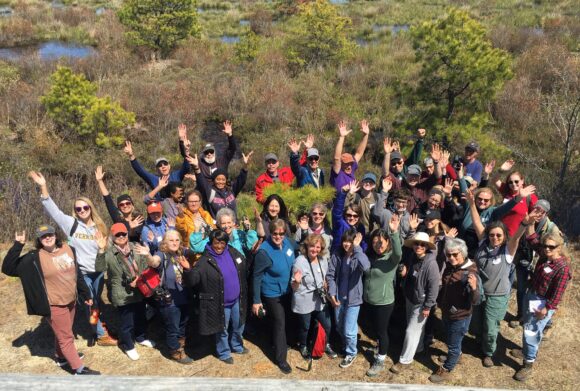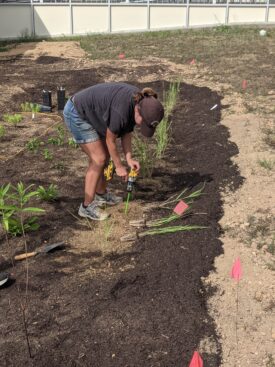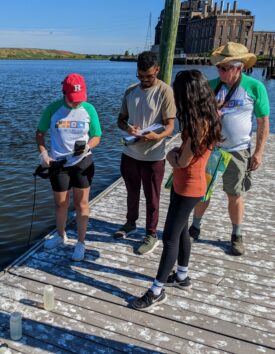
Environmental Stewards Program participants.

A steward helping to install a rain garden.
If you want to help protect the environment in your community, but you’re not sure where to start, then now is the time to join the Rutgers Environmental Steward Volunteer Program. The program teaches participants how to tackle important environmental issues and use what is learned to make a difference in their community. You don’t need a science background. Anyone can join the program.
“We’ve trained over 1,000 volunteers since the start of the program in 2005, many of whom are still making an impact within their communities. – county agent Michele Bakacs, Rutgers New Jersey Agricultural Experiment Station, Cooperative Extension.
Stewards attend weekly classes on topics such as climate change, green infrastructure, environmental justice, and wildlife habitat. Each class is taught by a leading researcher from Rutgers University, a government agency, or the non-profit sector. The 2023 class will run from January 24 through May 16 on Tuesdays from 5:30-8:00 p.m. The program fee is $260. The class is a hybrid format of zoom sessions, in-person instruction, field trips, and on-demand electives.
Participants complete a 60-hour volunteer internship within their community to become certified Rutgers Environmental Stewards.
My project was very important to me, in several respects. I used the skills and knowledge that I learned in class — about soil compaction, water conservation, native plants, pollinators, and rain gardens (of course) — and the project reinforced my learning. Getting outdoors, shovel in hand, building something useful for our town and our environment, which people appreciated, was incredibly satisfying and energizing for me. – Steffen, RES Certification Recipient 2022

Stewards helping LRWP with water quality monitoring along the Raritan River at Ken Buchanan Park in Sayreville.
Examples of recent projects include:
- Working under the supervision of the Atlantic County Utility Authority and township public works staff, two of our environmental stewards visited neighborhoods on recycling day. Their goal was to identify the most common recycling mistakes and contaminants, measure the effectiveness of informational tags on recycling behavior changes and provide information and feedback to residents. The stewards visually inspected recycling carts before collection and provided feedback to residents using tags that identify common contaminants. Based on what they saw, a tag was marked and attached to the bucket or cart to provide feedback to residents. They inspected each community over a 4-week period, and each week after the first there was a noticeable improvement as residents began adhering to the county’s new recycling regulations.
- Another environmental steward created a database that allows the Washington Crossing State Park permanent access to the labeling data and location of the trees in the arboretum. The database includes the common name, scientific name, family, origin, and the GIS coordinates of 107 trees. Using this information, a custom google map was developed for visitors to access. In addition, identification tags were designed and mounted following ADA guidelines. Visitors can now enjoy learning about the trees they see while walking the trails and the staff has a strong and accurate database. The map can be viewed at https://go.rutgers.edu/WCtreemap
Internship projects help Stewards get real-world experience and build relationships by working on local environmental problems. At the end of the class, we celebrate volunteer achievements at our Impact Summit.
The Rutgers Environmental Stewards program is a volunteer program offered in New Jersey through Rutgers Cooperative Extension, NJ Agriculture Experiment Station (NJAES), and Rutgers, The State University of New Jersey, in cooperation with individual county governments. The program is designed to increase the availability of University-based information to local communities and individuals through trained adult volunteers known as Rutgers Environmental Stewards. To learn more or to register visit the website.

